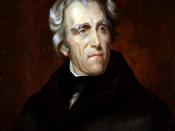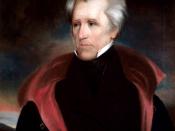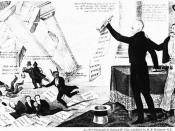A president, in the eye of Andrew Jackson, was the "representative" of the people. Not only that, his presidency was said to be that of the "common man," because his beliefs reflected those of the common man. He was the first American president to be born on the frontier, and as he declared, he governed on behalf of "the humble members of society- the farmers, mechanics, and laborers" (Tindall/Shi P.332). The presidential office he entered in 1829 would not be left the same after he left in 1837. Jackson's personal attitude and conflicts influenced the outcomes of his policies and actions, and as a whole strengthened the presidential office at the expense of congress. This can be shown through issues such as internal improvements, the tariff, and his demise of the National Bank.
To begin with, one of the reasons for Jackson's policy making and strong usage of the veto power was his conflicts with other politicians.
Jackson, new to political administration, leaned heavily on Van Buren, Secretary of State, for advice and for help in soothing the ruffled feathers of rejected office seekers (Tindall/Shi P. 335). Yet, Van Buren had his rivalries with others, such as Vice President John C. Calhoun of South Carolina, which led Jackson to accept policies and veto those in which Calhoun would be identified with. For example, during the first year of Jackson's administration, some issues concerning internal improvement were halted, one being the Maysville Road Bill. For Van Buren, it was easy to bring Jackson into opposition to internal improvements and thus to federal programs with which Calhoun had long been identified (Tindall/Shi P.336). What the bill proposed, which was excepted by congress, was that it authorized the government to buy stock in a road that lay within the state of Kentucky,



Well Done
Good Essay...Good Thesis to start with and also good transition words to continue paper with...
Was a little confused as to what you quoted as I did not see "" around sentences that were followed by (source)..
Also didn't see a full source name at the end of the paper, might be helpful for someone who is looking for sources on this President.
1 out of 1 people found this comment useful.